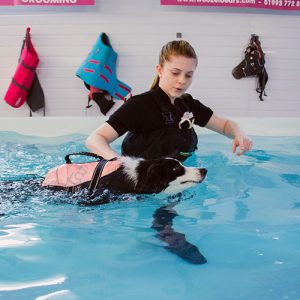Course Summary

This course features a blend of online theory and 4 days of practical hands-on training. Students must have prior experience working with animals, have great English speaking and writing skills and be a confident swimmer.
The Canine Hydrotherapy Association (CHA) recognises this course as part of their criteria for joining their membership for qualified Small Animal Hydrotherapists. In addition, once qualified, students can apply for an official membership of the International Association of Animal Therapists (IAAT)
4-day Practical Placement in a Covid-secure venue. Placement dates and venues available in UK & USA.
Placement locations: Chepstow, Witney, Aberdeen, Houston (USA), and Melksham.
Unit 1
Introduction to Hydrotherapy
This unit is intended to provide learners with background information on hydrotherapy. They will understand what hydrotherapy is and various aspects involved in hydrotherapy from the properties of water to the equipment used. The learner will know the legislation related to the practice of hydrotherapy.
Unit 2
Anatomy and Physiology of Small Animals
The unit aims to introduce anatomy and physiology to learners including body systems, tissue types and joint anatomy and physiology in small animals. This will assist understanding the relationship between anatomy and physiology and providing hydrotherapy to the patient.
Unit 3
Gait Analysis and Biomechanics
The aim of this unit is for learners to gain knowledge of gait patterns and relevant terminology, as well as posture and muscle contractions relevant to hydrotherapy treatment.
Unit 4
Hydrotherapy and Related Conditions
The aim of this unit is for learners to gain knowledge of the conditions that are commonly presented for hydrotherapy, including medical, orthopaedic and neurological conditions.
Unit 5
Maintenance of Equipment and Water Balance
Learners will develop the knowledge to understand the importance of key aspects of maintenance in a hydrotherapy setting. This will include water testing and how to interpret results from water tests.
Unit 6
Practical Administration of Hydrotherapy
Learners will explore the practical application of hydrotherapy from the initial assessment to the preparation of the patient, to hydrotherapy treatment and aftercare. They will be able to conduct hydrotherapy pool sessions. Learners will be able to demonstrate skills in the practical administration of hydrotherapy.
Unit 7
Professional Practice Management
The aim of this unit aims to demonstrate to learners the importance of Continual Professional Development and Professional Conduct within the workplace. Learners will develop knowledge of the roles and responsibilities within a hydrotherapy centre and the administration to be carried out.
Unit 8
Small Animal Assessment for Hydrotherapy
This unit provides explores the veterinary referral process, assessment, and health checking of small animals. It also looks at the various professional team members involved in treating patients, and their suitability for hydrotherapy.
Unit 9
Small Animal Behaviour
Learners will understand small animal behaviour in relation to hydrotherapy. They will develop knowledge related to safe handling and understanding body language in small animals.
Unit 10
Small Animal First Aid
This unit looks at the aims of first aid, different types of emergencies that the learner may come across in a hydrotherapy centre, and practical application of first aid techniques.
We offer a selection of accredited and employer recognised courses specifically designed for careers working with animals.
If you have any questions about our courses, please contact us.
We’ve assisted many people to achieve their goal to work with animals. Read more about our 5-star reviews and student success stories.
Gain relevant training to achieve your goal to work with animals.

